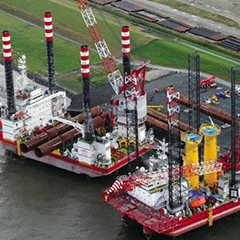A critical strategic gateway to Europe – and beyond – the ports operated by Seaports of Niedersachsen GmbH handle a considerable amount of onshore and offshore freight. But what challenges do the turbines present, and how is the industry evolving? We spoke to new Managing Director, Inke Onnen-Lübben.
PES: Welcome back to the magazine. How has business been since we last spoke? And what’s your on-the-ground assessment of the state of the market at the moment?
Inke Onnen-Lübben: Thanks for welcoming us again. The picture of the market is kind of divided right now. On the one hand, the field of onshore wind energy is still growing and the shipments of components, as well as complete wind energy plants, via our seaports in the German federal state of Niedersachsen is a very important and successful business field. ENERCON as one of the most important onshore manufacturers had chosen the port of Emden as one of its hubs for the worldwide export of its products. The port of Brake has handled in 2012 about 650,000 freight tons of onshore wind energy components for several manufacturers and is offering various value-added-services like, for example, spare part management for these customers. We are convinced that this business will also grow further in the medium term.
On the other hand, the offshore wind energy business in Germany is in a difficult situation at the moment. After the disaster in Fukushima our government decided to turn off all nuclear power plants until 2018 and to build up renewable energies instead to guarantee the power supply for our highly industrialized country. This was like a wake-up call for the offshore industry in Germany. The companies extended their production respectively planned new production sites and – to speak from the port operator’s viewpoint – new port facilities have been build according to the demand of the industry. But things went a bit different than expected.
Although there are several offshore wind parks in the North Sea which have already successfully been erected by using one of our offshore base ports (e.g. in Cuxhaven or Emden), we are right now facing some difficulties in establishing the grid connections of these offshore wind parks. The grid connection depends on political decisions and of course on the financing, which are both not clear. Also there are discussions going on about rising energy costs for the consumers as well as about subsidies for the offshore industry.
Due to that discussions and the uncertainty arising from that, several investors became more careful and stopped their engagements. This led to decreasing order volumes for the offshore manufacturers so that some of them had to close down their production sites temporarily or – which is less severe – they stopped planned investments in new production sites. There are still some offshore projects in progress in which some of our seaports in Niedersachsen are involved so we are coming off comparably well at the moment. After all the port of Cuxhaven for example has handled about 50,000 tons of offshore components in the first half-year of 2013.



























